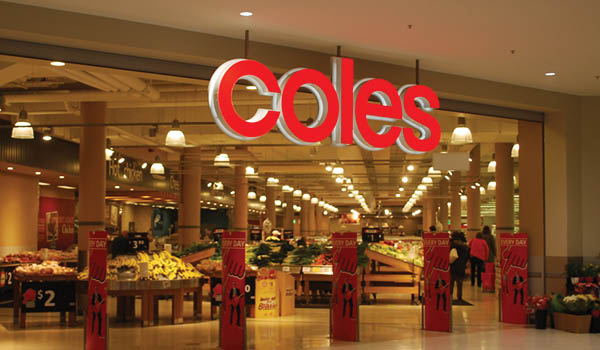Supermarket giant Coles is testing a new convenience store format in Melbourne.
The Australian reports three pilot stores have opened under the new concept, Big Yum at Little Coles, in Kew, South Yarra and Windsor.
The Big Yum at Little Coles stores reportedly offer a wider range of healthier snacks and on-the-go meals such as wraps, salads, and sushi as well as 80c coffee. Ready-made meals from Coles’ private label brand, which was relaunched earlier this year with more than 40 new varieties, are also available.
Big Yum at Little Coles has also attempted its own take on 7-Eleven’s trademark Slurpee, with its own brand of slushies called the Guzzle Bomb. According to The Australian, non-food products such as household and personal care are set at Coles’ supermarket pricing.
Simon McDowell, director of Coles Express, told The Australian Coles is watching the performance of the concept sites and “will look to incorporate successful elements of the format elsewhere in the store network”.
In 2015, Australian convenience store sales (excluding fuel) reached almost $8 billion, according to the Australasian Association of Convenience Store’s (AACS) State of the Industry (SOI) report. The channel reported value growth of 3.7 per cent year on year, outpacing grocery (1.1 per cent) for the fourth consecutive year.
Big Yum at Little Coles vs Coles Express
Gary Mortimer, associate professor at QUT Business School, told C&I Week Big Yum at Little Coles is about convenient food rather than footprint.
“[Coles] is positioning Big Yum at Little Coles against 7-Eleven with ready-made meals, healthier snacks and low price coffee. This is more about food and convenience than small, express format stores.”
Mr Mortimer says Coles Express stores are traditionally linked to the supermarket giant’s service station sites whereas Big Yum at Little Coles stores are standalone sites in inner city, high traffic areas targeting office workers and inner-city residents.
“Big Yum at Little Coles will still have Coles’ branding but positioned as a convenience store rather than a fuel service station store. In the UK, the growth of convenience has been driven by people moving closer to the city, greater population and the availability of land space for big supermarkets.
Mr Mortimer says cheap coffee and low price menu items such as pastries and doughnuts will initiate trial among consumers.
“I think convenience shoppers are happy to pay a premium for product but if there is a bargain to be had I think they will move and trial a new competitor. As long as [Coles] maintain a good quality product and their position is about offering good quality, fresh choices then they will certainly capture that market.”
Woolworths walks away from four Metro stores
It comes as Woolworths plans to shut four of its small format Metro stores. Last month Woolworths announced it would close as many as 30 stores, including four Metro sites, and axe 500 head office jobs as it tries to turn its fortunes around.
At the time of the announcement a Woolworths’ spokesperson was unable to confirm the locations of the closing Metro sites as part of the restructure. The Woolworths Metro format was first launched by the supermarket chain in 2013 in Woolloomooloo, Sydney. The express style stores are understood to generally operate on an average footprint of around 600sqm and are located in inner city, high foot traffic locations.
Metro stores offer a tailored range of products, placing a large focus on ‘grab and go’ solutions and ready-made meals. A $9 lunch deal is available at Metro stores which involves customers selecting a sandwich (or wrap or salad) with a snack and drink. It has been reported Woolworths is looking to extend this meal deal offer to include dinner items.
In June, Woolworths opened its smallest Metro store to date in Sydney’s CBD. Located on York Street, the 310sqm store takes the total number of Metro stores to 16, with seven stores in both New South Wales and Victoria, and two stores in Queensland. Despite the closures, Woolworths has since announced a new Metro store will open George Street in Sydney’s CBD later this year.
Global convenience challenges
Mr Mortimer says there is a risk for supermarkets moving to the convenience sector, citing examples such as UK retailers Tesco and Morrisons which have slowed expansion of their convenience concepts, choosing to focus on supermarkets instead, as well as US retailer Walmart which shut its entire network of express stores earlier this year.
“It is a good strategy to move into convenience if you have the management expertise to do it but running convenience stores is very different to running a supermarket. If you’re going to maintain supermarket pricing in convenience there’s not going to be a lot of margin.
“You can run a convenience store on 13-15 per cent wages – but you would run a supermarket on less than 8 per cent on wages. So all of a sudden you’re operating expenses increase and if you’re not managing that business well, it erodes your profit pretty quickly.
“There’s a few major supermarkets that have had a nibble at convenience market and I think if they’re strategic in their locations and manage their costs well, they will do well but if they don’t have the expertise, if they overestimate then what they will end up doing is simply cannibalising their own sales.”
C&I contacted Coles for comment.
Gary Mortimer will be speaking at the C&I Expo on August 17-18 in Melbourne. To register to attend the C&I Expo, click here.
Sign up to C&I’s free bi-weekly newsletter here to receive the latest industry news every Tuesday and Thursday. Follow C&I on Facebook, Twitter and Linkedin.


Hi I m interested to open plz gv quate
Hi I m interested plz gv me call 0430270585